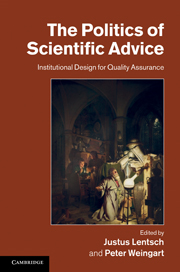Book contents
- Frontmatter
- Contents
- List of figures
- List of tables
- Acknowledgements
- Biographical notes
- Part I Methodological issues: quality control and assurance in scientific policy advice
- Part II Collegial science advisory bodies
- Part III Collegial science policy advisory bodies
- 8 RMNO and quality control of scientific advice to policy
- 9 Quality assurance through procedures – policy advice by the German Science Council
- Part IV Research-based advisory organisations
- Part V Academies of science
- Index
- References
8 - RMNO and quality control of scientific advice to policy
Published online by Cambridge University Press: 25 October 2011
- Frontmatter
- Contents
- List of figures
- List of tables
- Acknowledgements
- Biographical notes
- Part I Methodological issues: quality control and assurance in scientific policy advice
- Part II Collegial science advisory bodies
- Part III Collegial science policy advisory bodies
- 8 RMNO and quality control of scientific advice to policy
- 9 Quality assurance through procedures – policy advice by the German Science Council
- Part IV Research-based advisory organisations
- Part V Academies of science
- Index
- References
Summary
RMNO, the Advisory Council for Research on Spatial Planning, Nature and the Environment in the Netherlands
RMNO, the Advisory Council for Research on Spatial Planning, Nature and the Environment, is a knowledge broker, focusing on the knowledge for the mid- to long-term that is needed in order to solve or mitigate societal problems. This knowledge is thought to be relevant for societal groups, policymakers and politicians. Policymakers can use this knowledge to underpin their strategic policies.
RMNO's main clients are five ministries, but RMNO nowadays also works for provinces and other decentralised authorities.
RMNO deals with the articulation of strategic knowledge needs, the assessment of available knowledge, the formulation of research questions, the evaluation of research programmes and the utilisation of knowledge in policymaking. Advice about knowledge infrastructure and networks is also one of the products of RMNO.
RMNO is an independent advisory council, financed by the five ministries mentioned above. The leading ministry is the Ministry of Housing, Spatial Planning and the Environment which also appoints RMNO's members. They fall into three categories: policymakers (directors of departments, research coordinators), scientists who are interested in societal problems and people from business and societal groups.
Advice and studies provided by the Council have either been requested by one or more ministries or have been produced on the Council's own initiative. RMNO does not allocate research money or research grants. That is the task of universities and the NWO, the Dutch Foundation for Scientific Research.
- Type
- Chapter
- Information
- The Politics of Scientific AdviceInstitutional Design for Quality Assurance, pp. 139 - 156Publisher: Cambridge University PressPrint publication year: 2011
References
- 3
- Cited by

